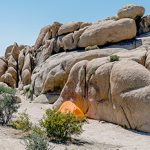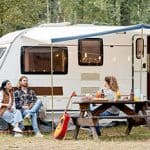
When my husband and I first started van camping there was a lot of slang words that we didn’t understand, boondocking was one of them. If you are new to van camping you might not have any idea what boondocking is either.
So what is boondocking and how do I do it? Boondocking is camping where there are no hookups such as water, electric, restrooms or any of the usual camping amenities. In other words you are staying where there are no facilities, in a remote, undeveloped area or literally in the boondocks.
And YES you can do it in your van!
When you are van camping out in undeveloped areas it brings a whole new dimension to camping that you don’t get in traditional campgrounds, there is a quiet serenity and you feel at one with nature. Obviously every boondocking site will not have the same features; however they all will give you a unique perspective on nature. So here are some things that will help you better understand boondocking.
Van Camping Life Tip: Don’t boondock on the other side of a small stream that you can drive through, it may rain during the night causing the water to rise and you won’t be able to get back out.
How do I boondock?
Boondocking is really easy to do, first select an area that you want to camp in with activities that you want to do nearby.
A good place to start your search for a site is to see if there are any public lands such as state or national forest lands, local or county parks, Bureau of Land Management areas close to the destination that you want to visit. State and federal agencies sometimes will use the term dispersed camping in lieu of boondocking.
Rules and regulations will vary regarding boondocking; sometimes even each state or province will have different requirements between lands in their own system. You can check on the internet or at the ranger offices to see if and where you are allowed to camp in each situation.
The area where we live has a lot of back country township roads with spots wide enough to camp just off the edge of the road or at trail heads for old Civilian Conservation Corp trails, opportunities exist all over the country, you just have to search them out.
If you have a van to boondock in, it is easier than with a big RV, sometimes the roads are narrow, space for turning is limited and the boondocking site might not be conducive for parking a bigger vehicle.
After you have your general location narrowed down you can then move on to actually picking a van boondocking site.
Other Posts of Interest
- How Do You Winterize A Sprinter Camping Van?
- Do Camper Vans Hold Their Value?
- Why We Bought A Yeti Cooler
Van Camping Life Tip: Your van can get sweltering hot in the summer sun, if you are going to be at your site throughout the day another factor to consider is shade to help keep your van cooler.
What is a van boondocking site?
A van boondocking site is where you will actually park your van. Sites will vary depending on what location you are camping at, some may be grassy, have gravel or just packed ground to park your van on.
Look for a location that is level, has good drainage so if it rains you aren’t slopping around in the water and keep your boondocking site as small as possible so you create less impact on the environment.
Fire pits or rings may already exist at the boondocking site or you may not be able to build fires in that area at all. Some van boondocking sites may also have picnic tables available for your use.
Features that you may possibly find near van boondocking sites are streams for fishing, trails for hiking, biking or ATVing or even lakes for boating. On the opposite end of the boondocking spectrum there may just be nothing but wide open beautiful, serene spaces with nobody or nothing for miles.
Scout out your boondocking site, after you have arrived don’t set up camp immediately. It might appear to be a good location but after being there a little while you may find that there are things that you don’t like, so then you can just move on.
Each van boondocking location will offer different benefits and perhaps lack certain things that you would like; you will find that no two are going to be exactly alike.
Van Camping Life Tip: Make sure you don’t boondock behind a gate that someone can close and lock behind you, leaving you unable to get out in the morning.
What will I need to van boondock?
Water – You need to bring all your potable water with you as boondocking locations usually won’t have water accessible near the site. In addition to potable water you will have to bring enough water for all of your personal hygiene needs.
Remember that water you have used for dishes and personal hygiene will need to be disposed of usually at least 200 feet from all water sources.
Electric – If you want to use any appliances, charge phones, use your computer or any other items that require electric you will need a generator or a solar setup for power at your boondocking location.
You also have the option of putting an inverter system into your van, which hooks into your van’s electrical system. This could get a little involved, so you probably will want to have someone who specializes in auto wiring to install it for you.
A way to cook food – If your van isn’t equipped with a small kitchen you will need a way to cook your meals. Some boondocking locations you camp at will not allow campfires. If you are unsure about what is allowed in the area you are going to be camping at go with the safe bet and take along a camp stove.
Toilet facilities – Needless to say toilet facilities are must, if you have a portable potty in your van then you are all set. If you don’t have one you will need to either purchase one or you will have to carry a camp shovel with you for disposing of human waste.
Rules in most boondocking areas will require you to dig a hole 6″ to 8″ deep to deposit waste, cover it back over with dirt and disguise the hole. The agency in charge of the land where you are boondocking will usually require you to make sure it is at least 200 feet from campsites, water sources and trails.
Garbage bags or containers – Most likely there will be no garbage receptacles either, so be sure to include some garbage bags to contain your garbage until you can dispose of it after leaving the site. Everything that you bring in you must take out when you leave. Don’t forget to put the filled bags someplace where the wild animals can’t tear them apart and strew garbage all over the area.
Van Camping Life Tip: Be sure to tell a family member or friend where you are going to be boondocking and when you expect to be back. That way if you have a problem and your cell phone doesn’t work where you are at least they will know how to find you.
Why do people boondock?
Here are some of the reasons people boondock and the benefits they get from doing it:
- People boondock to save money on camping and traveling expenses, when you can camp for free it drastically cuts down on your camping expenses whether you are camping close to home or traveling across the country. The cost of just one night in a campground at one of their primitive sites will usually start at around $20 and if you want to have electric or water it will cost extra.
- Most campgrounds will have a limit on the number of people allowed at each site which is usually 2 people. There will be additional charges for more people and costs will start around $2 each depending on whether it is a child or an adult. As you can see expenses start to add up really fast camping at a campground.
- Van boondocking allows you to be out by yourself, not surrounded by other people and all the other annoyances of being in an actual campground. You can enjoy the tranquil beauty of nature, watch the wildlife and just spend quiet time alone at your remote boondocking site.
- Boondocking offers the convenience of being able to stop and stay almost anywhere. In the past when we travelled in a car, sometimes near the end of the day we wanted to find a motel room and there were no vacancies, then we had to drive farther than we wanted. When van boondocking your “room” is right with you, just find a spot and use it.
- When we travel we like to be able to stop at places on a whim needless to say that isn’t favorable to keeping a tight schedule, so we didn’t want to be tied down to a motel reservation in a specific town.
- Boondocking allows you to stay in places that you want to explore longer, without having to track down a motel or campground for the night.
Is boondocking legal?

Yes, boondocking is legal provided you are in areas that permit it. You cannot however just set up your rig on private property, park at locations with no trespassing signs or no overnight parking signs.
Van Camping Life Tip: Arrive before dark so you can familiarize yourself with your surroundings and get set up for the night in daylight.
Related Questions
What is moochdocking? Moochdocking is when you park your van or RV on a friend or relatives’ property or if they live in town in their driveway to camp. Moochdocking is a great way to save on expenses, if you are lucky enough to have friends or relatives in the area you want to stay.
What is stealth camping? Stealth camping is when you camp someplace overnight that you wouldn’t normally camp, undetected. Choices for stealth camping include retail store parking lots, side streets, hospital parking lots or similar areas.
What is dry camping? Dry camping is camping without hookups. You can dry camp in campgrounds, simply by opting for one of their primitive sites.






